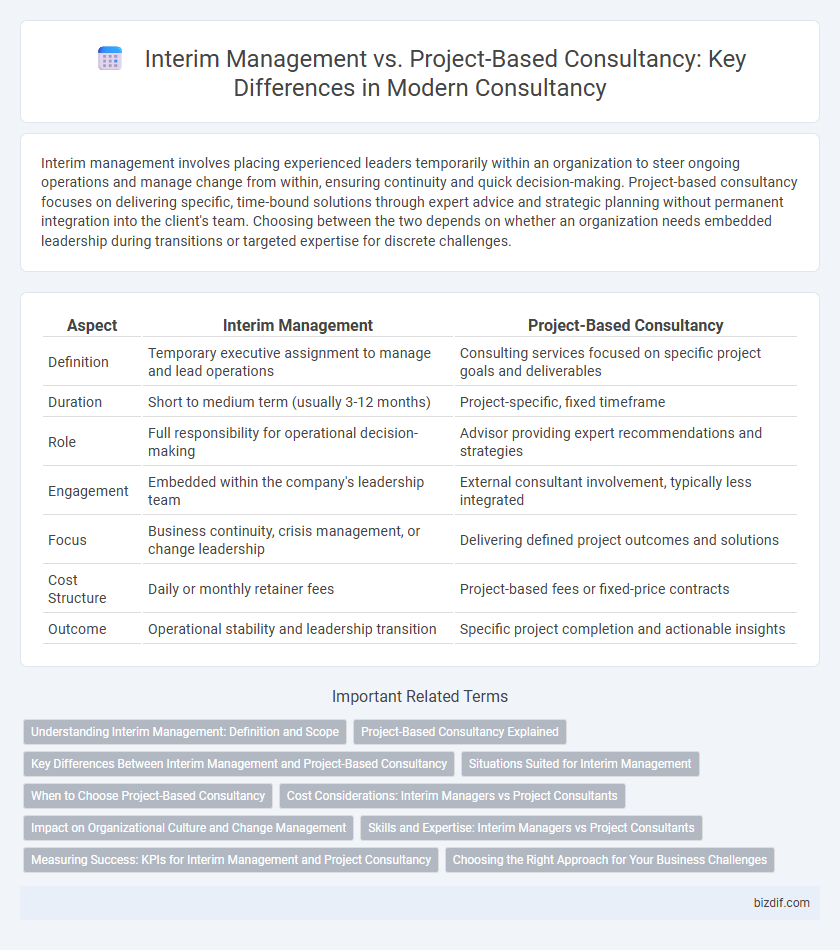Interim management involves placing experienced leaders temporarily within an organization to steer ongoing operations and manage change from within, ensuring continuity and quick decision-making. Project-based consultancy focuses on delivering specific, time-bound solutions through expert advice and strategic planning without permanent integration into the client's team. Choosing between the two depends on whether an organization needs embedded leadership during transitions or targeted expertise for discrete challenges.
Table of Comparison
| Aspect | Interim Management | Project-Based Consultancy |
|---|---|---|
| Definition | Temporary executive assignment to manage and lead operations | Consulting services focused on specific project goals and deliverables |
| Duration | Short to medium term (usually 3-12 months) | Project-specific, fixed timeframe |
| Role | Full responsibility for operational decision-making | Advisor providing expert recommendations and strategies |
| Engagement | Embedded within the company's leadership team | External consultant involvement, typically less integrated |
| Focus | Business continuity, crisis management, or change leadership | Delivering defined project outcomes and solutions |
| Cost Structure | Daily or monthly retainer fees | Project-based fees or fixed-price contracts |
| Outcome | Operational stability and leadership transition | Specific project completion and actionable insights |
Understanding Interim Management: Definition and Scope
Interim management involves temporarily placing experienced executives within an organization to rapidly address leadership gaps or steer critical transitions, providing hands-on decision-making authority. This approach contrasts with project-based consultancy, where external experts deliver specialized advice or complete specific tasks without direct operational control. Understanding interim management requires recognizing its scope in driving immediate business continuity, enabling swift organizational change, and embedding leadership within company culture for transformative outcomes.
Project-Based Consultancy Explained
Project-based consultancy delivers specialized expertise tailored to specific organizational challenges, ensuring targeted solutions within defined timelines and budgets. Consultants focus on achieving measurable outcomes through structured project phases, from analysis and planning to implementation and evaluation. This approach enhances flexibility and scalability, allowing businesses to adapt quickly to market changes without long-term commitments.
Key Differences Between Interim Management and Project-Based Consultancy
Interim management involves placing experienced executives directly into a company's leadership role for a limited period to manage ongoing operations and drive immediate results. Project-based consultancy focuses on delivering expertise and solutions for specific projects, with consultants working alongside existing teams without assuming direct management responsibility. Key differences include the scope of authority, with interim managers having decision-making power, and the engagement structure, where project consultants provide recommendations and support without permanent leadership roles.
Situations Suited for Interim Management
Interim management is ideal for organizations facing urgent leadership gaps, transitional periods, or the need for specialized expertise to drive change swiftly. It suits scenarios requiring hands-on decision-making authority and seamless integration into the existing team to maintain business continuity. Unlike project-based consultancy, interim managers embed themselves within the company to deliver immediate operational impact.
When to Choose Project-Based Consultancy
Project-based consultancy is ideal when a company requires specialized expertise for a specific, time-bound initiative with clearly defined goals and deliverables. This approach ensures targeted solutions, measurable outcomes, and efficient resource allocation without long-term commitment. Organizations benefit from project-based consultancy when aiming to implement change, launch new products, or resolve complex challenges within set deadlines.
Cost Considerations: Interim Managers vs Project Consultants
Interim managers typically incur higher daily rates than project consultants due to their leadership roles and responsibility for ongoing operations, but they can provide long-term cost savings by ensuring continuity and swift decision-making. Project-based consultancy often involves fixed fees aligned with specific deliverables, offering budget predictability and flexibility for short-term needs without the overhead of full-time engagement. Companies must evaluate the total cost of ownership, including potential downtime and management efficiency, when choosing between interim management and project consultants.
Impact on Organizational Culture and Change Management
Interim management embeds experienced leaders directly into organizations, accelerating cultural adaptation through hands-on change management and real-time decision-making. Project-based consultancy delivers targeted expertise by addressing specific challenges, fostering incremental cultural shifts aligned with project goals without prolonged internal presence. Both approaches influence organizational culture differently; interim management drives transformational change, while project-based consultancy supports targeted improvements within established frameworks.
Skills and Expertise: Interim Managers vs Project Consultants
Interim managers offer hands-on leadership with extensive operational expertise, driving immediate change and maintaining continuity during transitional periods. Project consultants bring specialized skills tailored to defined project objectives, delivering targeted solutions through analysis, strategy, and advisory functions. The choice depends on whether an organization requires embedded management capabilities or expert guidance for specific challenges.
Measuring Success: KPIs for Interim Management and Project Consultancy
Interim management success is measured through KPIs like leadership effectiveness, operational continuity, and achievement of specific organizational objectives within the interim period. Project-based consultancy focuses on KPIs related to project deliverables, budget adherence, timeline compliance, and client satisfaction ratings. Comparing these KPIs highlights the operational stability provided by interim managers versus the targeted, outcome-driven results of project consultants.
Choosing the Right Approach for Your Business Challenges
Interim management delivers hands-on leadership by embedding experienced executives directly into your organization to navigate complex transitions or fill critical gaps. Project-based consultancy offers specialized expertise focused on defined deliverables, ideal for addressing specific challenges without long-term commitments. Selecting the right approach depends on your business's urgency for immediate leadership versus the need for targeted solutions with clear end goals.
Interim management vs Project-based consultancy Infographic

 bizdif.com
bizdif.com